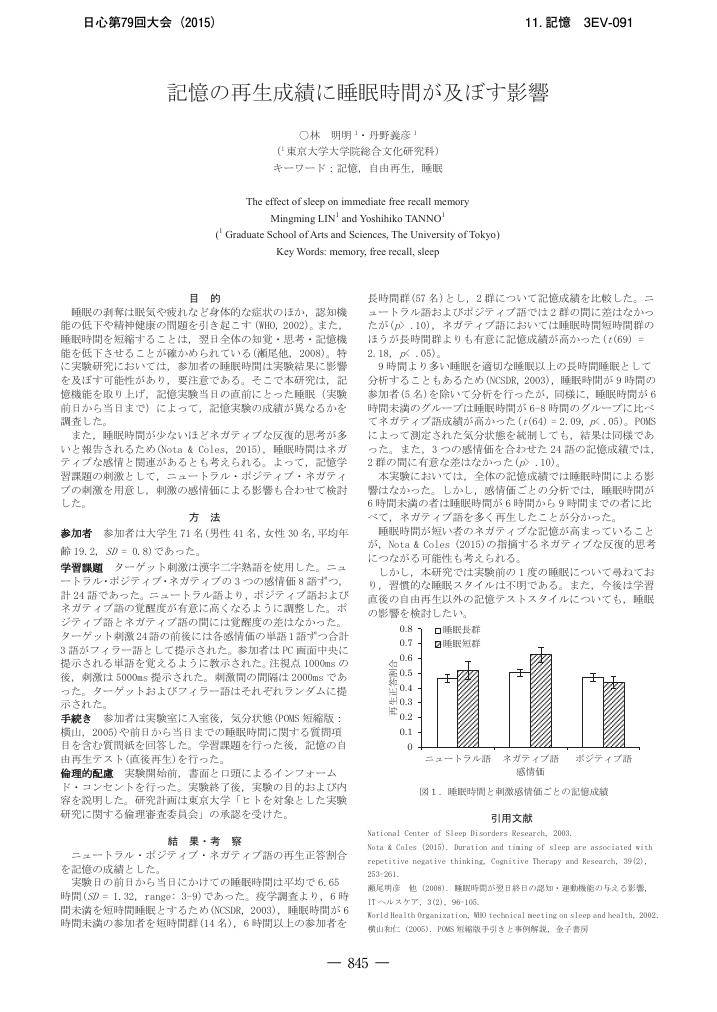- 著者
- 松島 公望 林 明明 荒川 歩
- 出版者
- 日本社会心理学会
- 雑誌
- 社会心理学研究 (ISSN:09161503)
- 巻号頁・発行日
- vol.35, no.2, pp.39-49, 2019-11-30 (Released:2019-11-30)
- 参考文献数
- 38
This study examined the relationship between Christian religious consciousness (CFC) and subjective well-being for Japanese Christians. Members of the Roman Catholic Church (status of denomination: Believers, n=58; Leaders, n=61) and of the A subgroup of the Holiness Church (status of denomination: Believers, n=646; leaders, n=102) participated in the research. Based on factor analysis, we developed a scale of CFC that contained three factors: “Christian doctrine-based belief,” “norms of religious activities,” and “relationship with other church members.” Hierarchical multiple regression analysis on CFC and subjective well-being showed that the people who had high “Christian doctrine-based belief” or a high “relationship with other church members” have high subjective well-being, and that they were partially influenced by subjective well-being among denominations. However well-being was not influenced by status of denomination. These results indicate that subjective well-being rests largely on CFC, although a small portion of it rests on the type of denomination.
2 0 0 0 OA 健常成人におけるカフェインの摂取とストレス反応の関連
- 著者
- 伊藤 真利子 林 明明 金 吉晴
- 出版者
- 公益社団法人 日本心理学会
- 雑誌
- 日本心理学会大会発表論文集 日本心理学会第84回大会 (ISSN:24337609)
- 巻号頁・発行日
- pp.PR-010, 2020-09-08 (Released:2021-12-08)
【背景・目的】カフェインは世界的にも好まれている飲料の一つであるが心理・生物学的影響について未解明の点も多い。カフェインの摂取により,安静状態での副交感神経系が優位になるとの報告がある一方で,パニック発作や不安症状が引き起こされるという報告もある。本研究では心身共に健康な成人を対象に,カフェイン関連の飲食物を制限した状態(制限期)と普段通りの量を摂取した状態(摂取期)とで,ストレス刺激への反応を観察した。【方法】20歳以上の男女23名が参加した。参加者には初回参加時にカフェイン関連の飲食物の漸減を求め,1週間後に実験室への来室を求めた。さらにその後1週間で再び元の摂取量までの漸増を求めて,合計3回の来室をもって参加終了とした。制限期と摂取期においてストレス刺激への反応を測定するため,安静時とホワイトノイズ提示後の不安(STAI),Visual Analog Scale,気分状態(POMS)の評定を求めた。【結果・考察】ノイズへの気分反応はカフェイン制限期・摂取期によらず概してネガティブであることを確認した。摂取期よりも制限期の方が不安,ストレスの程度が高く評定され,カフェインの摂取によるストレス反応の緩和が示唆された。
- 著者
- 松島 公望 林 明明 荒川 歩
- 出版者
- 日本社会心理学会
- 雑誌
- 社会心理学研究 (ISSN:09161503)
- 巻号頁・発行日
- pp.1730, (Released:2019-10-21)
- 参考文献数
- 38
This study examined the relationship between Christian religious consciousness (CFC) and subjective well-being for Japanese Christians. Members of the Roman Catholic Church (status of denomination: Believers, n=58; Leaders, n=61) and of the A subgroup of the Holiness Church (status of denomination: Believers, n=646; leaders, n=102) participated in the research. Based on factor analysis, we developed a scale of CFC that contained three factors: “Christian doctrine-based belief,” “norms of religious activities,” and “relationship with other church members.” Hierarchical multiple regression analysis on CFC and subjective well-being showed that the people who had high “Christian doctrine-based belief” or a high “relationship with other church members” have high subjective well-being, and that they were partially influenced by subjective well-being among denominations. However well-being was not influenced by status of denomination. These results indicate that subjective well-being rests largely on CFC, although a small portion of it rests on the type of denomination.
1 0 0 0 OA 記憶の再生成績に睡眠時間が及ぼす影響
- 著者
- 林 明明 丹野 義彦
- 出版者
- 公益社団法人 日本心理学会
- 雑誌
- 日本心理学会大会発表論文集 日本心理学会第79回大会 (ISSN:24337609)
- 巻号頁・発行日
- pp.3EV-091, 2015-09-22 (Released:2020-03-27)
